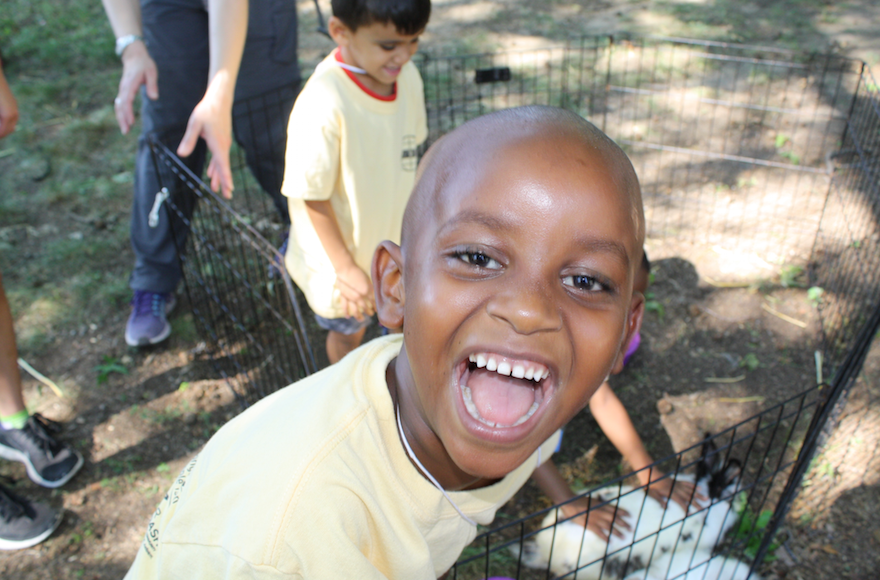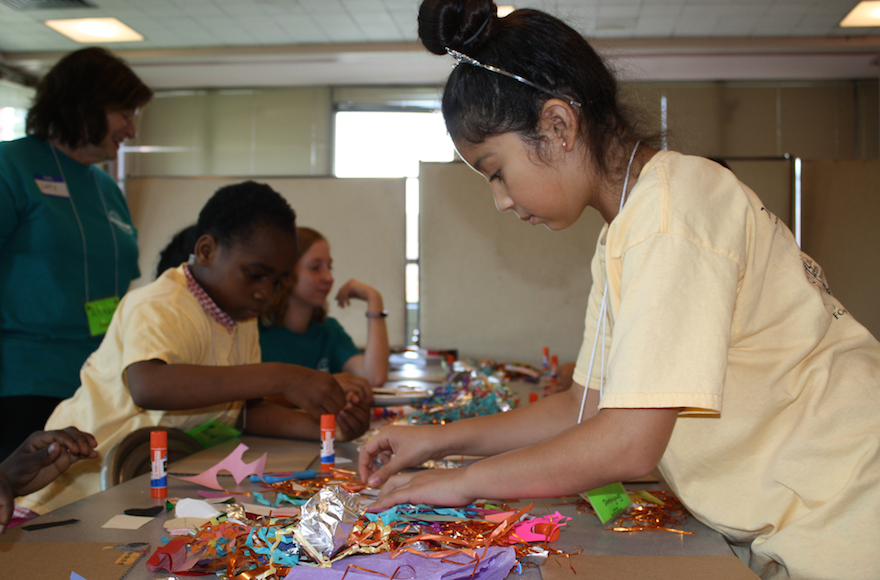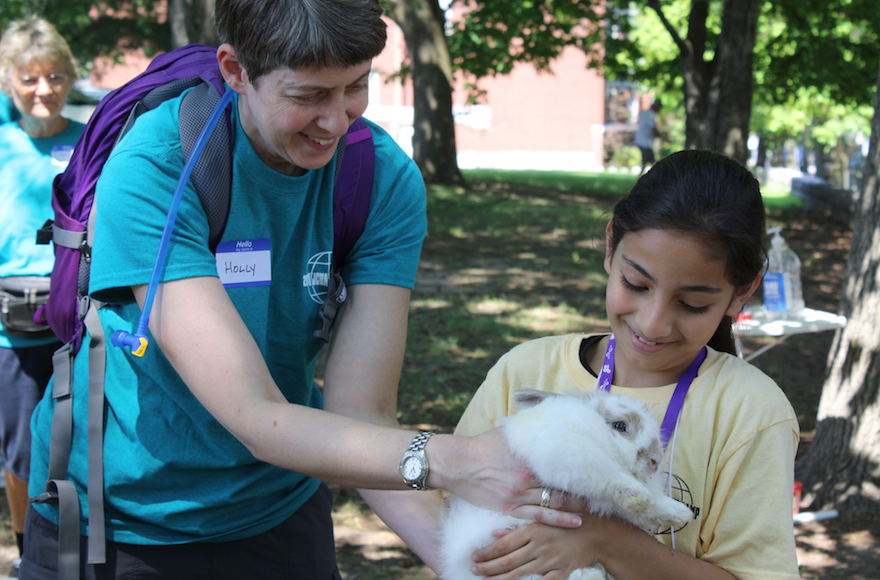(JTA) — When he signed up to be a counselor at a Jewish-run summer camp for refugee children, Isaac Eastlund expected to confront trauma.
Instead, when he would come up to his campers, a couple months or years removed from fleeing Afghanistan or the Democratic Republic of the Congo, he’d find them plugged into their phones, listening to some of his favorite rappers, like Migos or Kendrick Lamar.
“I was nervous just because I knew I’d be working with refugees, and I had this expectation that they might be damaged in some way and it might be difficult to navigate around that,” said Eastlund, 18. “But the cool part to me was seeing how normal these kids really are, and how easy it was to connect with them on a personal level.”
Eastlund, who just graduated from a St. Louis-area high school, is a counselor at a day camp for refugees run by the local Jewish Community Relations Council. It’s one of a few summer camps across the country for refugees run by Jews. The camps hope to acclimate the new arrivals and ease the load for their parents. But mostly they want to provide a relaxed space where kids can be kids.
“The cultural barrier we see the most is these kids are on guard,” said Alyssa Banford, a staff member at the JCRC who coordinates the St. Louis camp’s operations. “The kids who have just arrived in the U.S. are totally overwhelmed and they have their guards up. They haven’t been in an environment where they can be just kids and have fun.”
The St. Louis program, in its second year, has approximately 80 campers and 160 staff volunteers this summer. It runs three hours a day for four weeks.
In Washington state, the Union for Reform Judaism co-organizes two weeklong camps for refugees. And a synagogue in Sacramento, California, will soon open its two-week camp for refugees alongside the day camp it runs on its campus for Jewish kids.
Each of the camps is run in conjunction with a local immigrant aid organization. The Jewish organizers say they hope to provide a friendly atmosphere for the kids in a country where immigrants can feel threatened by the national mood.
“Our political climate is such that it would be very easy for a new immigrant or refugee to feel as if they’re not welcome here,” said Rhonda Banford, Alyssa’s mother, a speech pathologist who serves as the St. Louis camp director. “It’s really important to me to let them know that we’re happy they’re here.”

The kids at the St. Louis summer camp for refugee families pick up English quickly, staff members say. (Courtesy of St. Louis JCRC)
For the families of the children, the camps offer a dual benefit: structured time with other kids, and supervision that enables parents to work or study. The St. Louis camp’s hours coincide with English classes for the campers’ parents at the International Institute of St. Louis, an immigrant integration service, which also hosts the camp.
Ahmad Ibrahimi, who emigrated from Afghanistan with his wife and two children, hopes the Sacramento staff will help fill the caretaker roles played by members of his extended family in his home country.
“There we lived in a family,” he said. “Everyone lived together, but here there is no one. They should go out and find more friends. It makes their life here easier.”
The kids spend most of their time playing soccer or doing arts and crafts, but they and their counselors still need to bridge some cultural divides. Counselors are encouraged to use gestures and other nonverbal communication to include kids who are still learning English. The Sacramento camp, called Camp Nefesh, or soul, instituted a dress code for counselors out of respect for Middle Eastern modesty norms.
“Some of the kids wear hijabs,” said Denise Crevin, the director of education at Congregation B’nai Israel, which hosts and runs Camp Nefesh. “Our counselors can’t wear their super-short shorts or skinny tank tops because we’re working with a population where they’re not used to those things. I just encourage the counselors to not be shy about getting clarity.”
But staff members across the camps said English is not a major obstacle. The kids pick up the new language quickly, they said — especially because they live among English speakers all year. Rhonda Banford said the kids who returned to the St. Louis camp for a second year came with drastically improved English.
“Most of them speak pretty well and they understand a lot, so we had to up our English activity,” she said. “I thought we would have to be teaching them nouns and action words. Instead we’re playing Pictionary and charades.”
Although the camps aim to provide the children with an escape, counselors still need to be cognizant of the often painful experiences endured by their campers. The Washington camps teach their counselors to be especially gentle and empathetic.
“Even if the context of the camp is fun — that’s sort of the energy there — there’s still things refugees can be triggered by,” said Jonah Freelander, director of strategic partnerships and development for Mitzvah Corps, a teen social justice initiative of the Union for Reform Judaism. Teens are instructed, he said, to “avoid perception of an aggressive interaction, to not raise their voice, be patient, make sure everyone feels included.”

The kids at the St. Louis camp spend most of their time playing soccer or doing arts and crafts. (Courtesy of St. Louis JCRC)
At the St. Louis camp, the staff tries to make cultural acclimation fun. Members of the United Soccer League’s Saint Louis FC have visited the campers, as has Fredbird, the St. Louis Cardinals’ mascot. The campers experienced a “Taste of St. Louis,” which included local cuisine like toasted ravioli, St. Louis pizza (yes, it’s a thing) and gooey butter cake. At the end of the summer, the kids will participate in an “I am an American” parade.
“It’s a good experience for them to be with the people, to be around the kids,” said Mohammed Yaqoob, whose two children, aged 9 and 6, attend the St. Louis camp and enjoy playing soccer there. “Especially when they took them outside, they have a lot of fun.”
Despite the contentiousness around immigration nationally, the Jewish organizers say they have gotten little pushback from their communities because American Jews’ immigrant heritage has made welcoming refugees a consensus priority. Crevin said that after watching the national immigration debate unfold, her congregation’s youth jump at the opportunity to put their values into action.
“The population of teens who want to help with this effort feel a little paralyzed: Stuff is happening in the world, and how am I going to make a difference?” she said. “This is a chance to do something.”
JTA has documented Jewish history in real-time for over a century. Keep our journalism strong by joining us in supporting independent, award-winning reporting.






